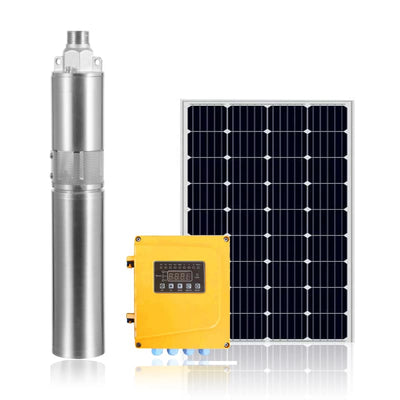
Green energy water lifting offerings presents an eco-minded economical approach to aquaculture. Through harnessing daylight energy these setups extract water from different origins including wells, to serve the needs of farmers. Sun-driven pump solutions are durable and demand minimal maintenance, making them suitable for grid-connected and remote environments.
Photovoltaic water lift systems consist of solar panels that convert sunlight into electricity, which then drives a pump. Numerous types of pumps are available, such as centrifugal submersible piston-style pumping units, each matched with unique water lifting requirements.
- PV pumping solutions minimize fossil fuel use and promote cleaner ecosystems.
- Additionally, these systems supply a steady water supply for off-grid locations with limited grid access.
- Consequently, solar water pumping is growing in adoption worldwide as a sustainable water-management option.
Harnessing Solar Energy for Irrigation
Looking for a reliable and eco-friendly way to irrigate your garden? Pond-mounted photovoltaic pumps present an inventive approach, using sunlight to transfer pond water to farm plots. These pumps are a sustainable choice for irrigation, eliminating the need for fossil fuels and reducing your environmental footprint.
Low-maintenance long-life pond pumps make a budget-friendly method to secure ongoing water supply for agricultural use. Choose renewable-driven pond pumps to reduce carbon footprint.
Photovoltaic submersible pumps deliver steady deep well access where grid power is limited.
Solar-Powered Submersible Pumps
In regions with limited grid access, dependable water sources are essential for agriculture. Immersion pumps, traditionally fueled by electricity from the grid, can be costly to operate and maintain. Technological progress in PV systems has enabled sun-powered submersible pumps as an eco-friendlier alternative. Modern PV-driven submersible systems generate power onsite to run deep-well pumps. It minimizes grid and fuel dependence, creating an economical path to clean water.
Harnessing Sunlight for Water Access
Sun-derived power is especially promising for energizing water access systems. Solar well pump installations represent a transformative option merging green power with dependable irrigation and household supply. They use solar energy to run robust pumps that extract water from deep aquifers, supplying consistent access in remote zones.
Moreover, solar well pump systems offer numerous features including reduced energy costs, lower carbon footprint, and increased energy independence.|These well pump systems deliver reduced operating expenses, decreased emissions, and greater autonomy.|Among benefits are lower energy bills, reduced carbon output, and strengthened energy sovereignty.} Using abundant solar energy supports long-term water access and environmental stewardship for coming generations.
- Picture a world where every community, regardless of its location, has access to reliable and sustainable water sources.
- Solar well pump systems make this vision a achievable goal.
- We can explore the profound impact of these systems on rural communities, agriculture, and the environment.
Go Green with Solar: Versatile Water Pumping Applications
Water is essential for life and crop cultivation, but accessing it can be a obstacle. Old approaches usually use fossil fuel inputs that raise environmental harm. Thankfully, photovoltaic pumping offers a greener substitute. This technology harnesses the power of the sun to move water efficiently and consistently. Solar water pumps are perfect for a wide range of applications, from irrigating crops in remote areas to delivering safe drinking water in communities lacking traditional infrastructure. Zero fuel expenses and low upkeep make PV pumping an economical choice benefiting ecology and budgets. Here are core advantages of solar-driven water systems: * Renewable energy source * Lower fuel expenses * Eco-conscious * Dependable functionality * Quiet operation well submersible pump Switching to solar water pumping is a wise decision for a green future.Optimizing Solar-Powered Water Systems
Reaching top efficiency for photovoltaic pumps requires a layered strategic effort. Selecting the right solar panels, implementing efficient pumps, and optimizing system design are crucial steps in this process. By exploiting the power of the sun, we can establish sustainable and trustworthy water pumping solutions for various applications.
- Factors influencing efficiency include panel placement, ambient heat, and system maintenance.
- Innovative advancements in solar panels and pump technology are constantly propelling the boundaries of efficiency.
- Data-driven monitoring and control systems can further enhance performance and minimize operational costs.
Sustainable Aquifer Utilization with Solar Well Pumps
Fresh groundwater aquifers play a key role in agriculture, domestic use and commercial needs. But excessive pumping and climate impacts endanger aquifer sustainability. To mitigate these threats, alternative solutions like solar well pumps are gaining momentum. Sun-driven well pumps enable efficient groundwater extraction with lower environmental toll. By harnessing the power of the sun, these systems reduce reliance on fossil fuels and lower greenhouse gas emissions.
- Solar well pumps promote aquifer recharge by optimizing water use.
- They provide a consistent source of energy, ensuring availability to clean water even in remote areas.
- Additionally, solar well pumps minimize operational costs and maintenance requirements compared to traditional diesel-powered pumps.
Harnessing Solar Energy
Wells hide accessible reserves of energy that can be unlocked. Solar radiation supplies the key resource to realize that potential. By harnessing its radiant beams, we can energize our homes and lives in a sustainable and environmentally sound manner.
- Solar panels
- Collect
- Daylight
This renewable energy source offers a vast supply, allowing us to decrease our reliance on traditional energy. Embracing sunlight energy advances ecological responsibility and a brighter future.

Water Powered by the Sun
Facing intensifying water shortages, new sustainable solutions have appeared. Photovoltaic water lifting is gaining hold as an economical green replacement for conventional approaches. Using PV arrays, these pumps supply water for irrigation, animals, households and small hydropower use.
Advantages of PV pumping span many areas. It lowers fossil fuel dependency, cuts emissions and supports sustainability. They provide independence from grid electricity and on-site fuel logistics. Consequently they fit remote contexts lacking dependable grid power.
- Furthermore, solar water pumping systems are relatively low maintenance and have a long duration with proper care, resulting in long-term cost savings.
- The technology is also adaptable to diverse applications, ranging from small farm plots to large-scale agricultural operations.
Therefore, solar water pumping represents a transformative shift towards sustainable water management. By embracing this renewable energy solution, we can ensure access to clean water, empower communities, and make a difference in safeguarding our planet for future generations.
Harnessing Solar Energy for Irrigation
Boosting crop yields naturally is a goal shared by many farmers around the globe. Photovoltaic irrigation systems offers an innovative and sustainable solution to this challenge. Using solar energy, growers can deliver water efficiently to crops while cutting dependence on energy-intensive conventional methods. The green method supports conservation while improving plant growth and yields. Over time photovoltaic irrigation lowers running costs versus fuel-dependent systems.
- Benefits of using solar-powered irrigation include:
- Reduced dependence on fossil fuels.
- Increased crop yields and standard.
- Efficient water management.
- Reduced operational expenses.
Solar-Powered Watering Systems

Revolutionizing the way we water our gardens and landscapes, solar-powered watering systems are emerging popularity. They capture sunlight to power pumps that deliver water in an efficient sustainable manner. By capturing sunlight into electricity, solar panels energize a pump that delivers water to plants, lowering reliance on traditional energy sources.
- Furthermore, these systems are budget-friendly in the long run, as they reduce monthly utility costs.
- Furthermore, solar-powered watering systems present a green solution for irrigation, contributing to a more responsible future.
Through the advancements in solar technology, these systems are becoming increasingly convenient, permitting homeowners and cultivators to benefit from a more efficient approach to watering.
